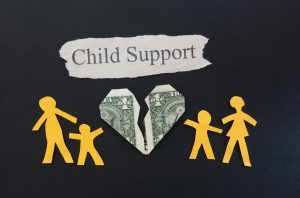How much is child support in NJ?
Child support in New Jersey is calculated according to a formula known as the Child Support Guidelines. Many people think that child support in NJ is a percentage of the parties’ incomes. That is incorrect.
Most lawyers have a software program that calculates child support for them. We input certain data into the program, and it calculates the appropriate child support number. The data we need to know to calculate child support is:
- The number and ages of the children
- Who is the Parent of Primary Residence and who is the Parent of Alternate Residence
- The income of the parties from all sources
- Whether either parent has other children from another relationship and the amount of child support paid for that child
- The amount of any alimony paid or received by either party, if any
- The parenting schedule – specifically the number of overnights the PAR spends with the child(ren)
- The child’s share of any health insurance premium
- The cost of work-related daycare for the child
Once we have all of this data, we can calculate the amount of child support payable in your case.
NJ child support enforcement
Child support in NJ is usually paid by income withholding (or wage garnishment) and enforced by the probation department in the county where the payer resides. The person receiving child support has the right to receive child support payments through probation. If the payer is employed, then the payee can insist on a wage garnishment for the collection of support where the employer actually withholds the child support from the payer’s wages and pays it to probation who then pays it to the payee. If the payer is self-employed, the payee can still insist on payments through probation, but the payer would make direct payments of support to probation who then remits the payments to the payee.
The second less fool-proof method for child support enforcement is to accept direct payments of child support from the payer. The downside to this methodology is that if the payer does not pay, the payee has to seek enforcement by way of a motion or application to the court, which takes time and costs money on legal fees. When probation enforces child support, if the payer does not pay then probation will enforce the child support obligation on behalf of the payee.
Child support questions NJ
Child support can be a complicated process to calculate. We do not recommend that parents try to calculate child support on their own. When you have child support questions, we are happy to assist you in calculating child support for you and answering your questions. The State of New Jersey also has a very good website that provides answers to many child support questions here: https://www.njchildsupport.org/
How to file for child support in NJ
Whether you are married or unmarried, as long as you have a child, you can file for child support in NJ. To file for child support in NJ, you have to file an application known as a Summary Support Action. You can file a Summary Support Action whether you are married or not. You do not need to file for divorce at the same time you seek child support.
What do NJ child support laws cover?
Under the NJ Child Support Guidelines, the child support award covers fixed costs, including shelter and shelter-related costs; variable costs, including the cost of transportation and food for the child; and controlled costs, such as clothing, personal care, entertainment, and other miscellaneous expenses. The child support award also includes the first $250 of unreimbursed medical expenses per year, per child. Certain predictable, recurring expenses also may be added onto the child support award, such as work-related child care; health insurance (the marginal cost of adding a child to a health insurance plan); and predictable, recurring, unreimbursed health care expenses (in excess of the first $250 per child, per year). Other expenses may be added in as well, such as costs related to special needs and visitation transportation expenses.
What expenses are not covered by the child support amount I pay or receive?
There is some debate over this question. Generally speaking, unpredictable and/or non-recurring costs are not covered by or added into the child support obligation. Such costs may include the cost of private education, certain extracurricular activity costs, and the expense of special celebrations, such as a bar/bat mitzvah celebration or a “Sweet Sixteen” party. College tuition and related expenses also are not added into the child support obligation and are addressed separately.
How can you terminate child support in NJ?
Child support is paid until the children are deemed emancipated either by the Court or pursuant to agreement between the parties. Children typically become emancipated once they graduate from college and/or begin working full-time. Other circumstances under which children become emancipated include if the child marries or joins the military. If the parties cannot agree as to whether emancipation has occurred, an application to the Court must be made.
What age does child support end in NJ?
On January 19, 2016, Governor Christie signed N.J.S.A. 2A:17-56.67 into law. This law establishes 19 as the age when a child support and/or medical support obligation will end. The new law allows for child and/or medical support to continue up to age 23 for cases in which the dependent is still in high school; attending full-time college, vocational or graduate school; is disabled; if the parties reached a separate agreement; or, if continued support was granted by the court. The effective date of the law is February 1, 2017, and applies to all child support orders.
Contact us today to learn more about filing for Child Support in NJ.

 START LIVE CHAT
START LIVE CHAT











